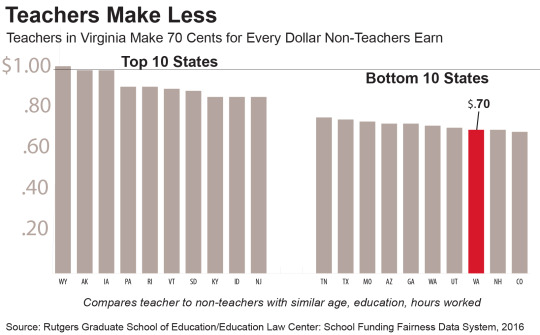March 8, 2018
Decision to Be Made on Teacher Pay in Pending Budget Deal
West Virginia lawmakers reached a deal on Tuesday to give teachers in the state a much needed pay increase of five percent. This comes at a time when Virginia legislators are negotiating a budget deal that may or may not include the state’s share of a two percent pay increase for teachers and school staff.
If we hope to compete with neighboring states for a shrinking supply of graduates this investment is needed here in Virginia. Reports show enrollment in teacher preparation programs continues to decline in Virginia (and nationally), while K-12 enrollment grows. This heightened competition for teachers results in many schools not being able to find candidates. A survey from the Virginia Department of Education (VDOE) found that we had over 1,000 unfilled teacher vacancies in the commonwealth as of October 2016, up from 800 in the 2015 survey.
Successfully recruiting graduates from other states or retaining our own requires competitive teacher salaries. Yet Virginia’s average teacher salary trails the national average and states like Pennsylvania, Maryland, Georgia, and Kentucky.
And it’s not just other states that Virginia schools compete with. They’re also competing with other occupations that students or teachers can choose to pursue. Virginia does even worse on national comparisons using that metric. The “wage competitiveness” of teacher salaries – how much teachers make in Virginia compared to other professions in the state with a similar age, degree level, and hours worked – ranks low for the commonwealth. A 2018 National Report Card, which ranks all 50 states and DC, puts Virginia near the bottom in the country at 49 out of 51 for teacher “wage competitiveness”.

That’s why it’s so vital that lawmakers here in Virginia follow the lead of our neighbor to the west and increase teacher compensation in the 2018-2020 budget deal.
The primary hurdle they face is a financial one. The two percent pay increase for just one year of the two-year budget will require the state to invest almost $88 million. That investment will be a serious challenge for any budget deal that does not include Medicaid expansion and the savings that come along with it. The House estimates that its proposal, which also includes a provider assessment, will save the state $371 million.
Including the savings from Medicaid expansion, as the House did, provides a clear path forward for increasing teacher pay and making other vital investments in K-12 education.
Category:
Education
